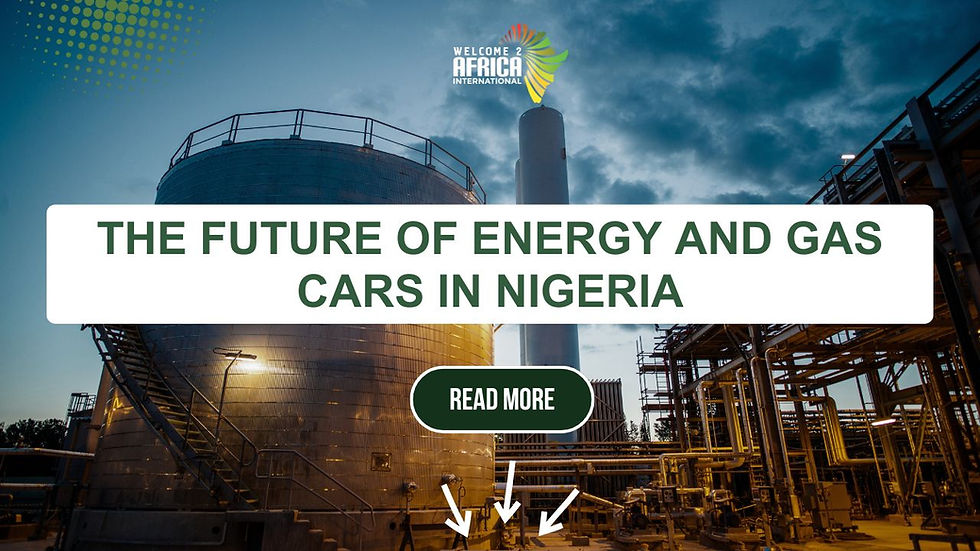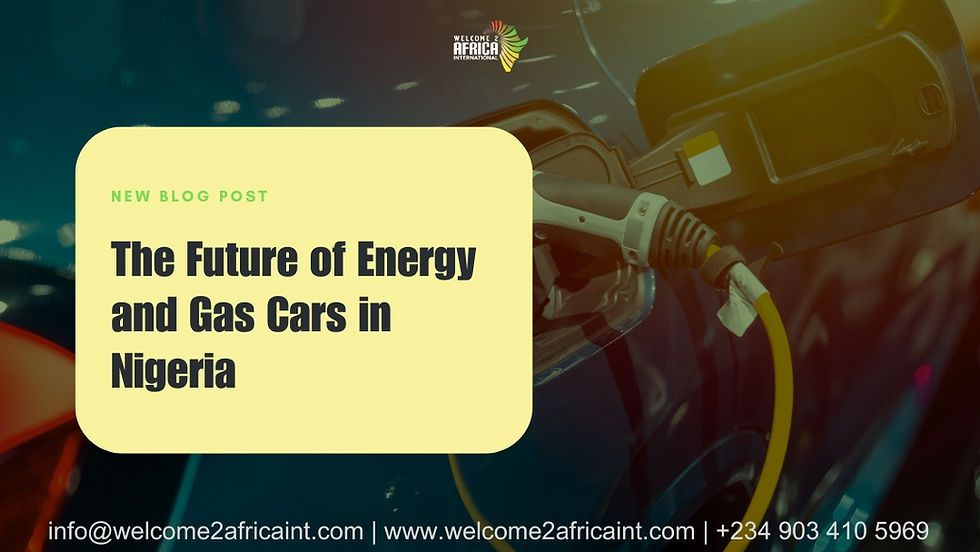The Future of Energy and Gas Cars in Nigeria
- Jun 10, 2024
- 3 min read

The future of Nigeria's energy landscape and automotive sector, particularly with regard to gas-powered automobiles, is coming under intense examination as the country navigates the opportunities and difficulties of the twenty-first century. Nigeria must make critical choices that will determine the direction of its economy and environment in light of the worldwide move towards renewable energy sources and electric vehicles (EVs).
Current State of Energy and Gas Cars in Nigeria
Fossil fuels, especially gas and oil, play a major role in the national economy and are the backbone of Nigeria's energy industry. The majority of vehicles in the transportation industry are gas-powered, thanks to the nation's large oil deposits. Nevertheless, there are a number of negative aspects to this reliance, including greenhouse gas emissions, air pollution, and economic sensitivity to changes in the price of oil globally.
Challenges and Opportunities
1. Environmental Impact: Using gas-powered vehicles increases carbon emissions and air pollution, which aggravates health problems and climate change. Moving towards greener energy sources and technologies is necessary to address this.
2. Economic Diversification: Less reliance on petrol and oil helps stabilise the economy and lessen its vulnerability to fluctuations in global markets. For long-term growth, diversifying into sustainable technology and renewable energy is a smart step.
3. Energy Access: Nigeria has serious problems with energy access, with many rural regions without consistent electricity, even though it is a major oil producer. Infrastructure for renewable energy may be expanded to improve accessibility and energy security.
The Future of Energy
1. Expansion of Renewable Energy: Nigeria offers enormous potential for renewable energy, especially wind and solar energy. Both urban and rural communities may benefit from dependable, clean electricity provided by infrastructure investments in renewable energy. The goal of programmes like Nigeria's Renewable Energy Master Plan is to raise the proportion of renewable energy sources in the country's energy mix.
2. Energy Efficiency: Reducing total energy consumption and emissions may be achieved by using energy-efficient technology in buildings, transportation, and businesses. Promoting energy-efficient industrial processes and appliances is part of this.
3. Gas Utilisation and Flaring Reduction: By lowering flaring and funding gas-to-power initiatives, Nigeria may better use its natural gas supplies. This can bridge the transition to a more renewable-focused energy future by offering a greener substitute for coal and oil.
The Future of Gas Cars
1. Electric Vehicles (EVs): The global shift towards electric vehicles presents an opportunity for Nigeria to modernize its transportation sector. EVs produce zero emissions at the tailpipe, reducing air pollution and dependence on oil. Government incentives, infrastructure development, and public awareness campaigns are crucial for promoting EV adoption.
2. Hybrid Vehicles: As a transitional technology, hybrid vehicles that use both gasoline and electric power can help reduce emissions and fuel consumption. They can serve as an interim solution while EV infrastructure is being developed.
3. Alternative Fuels: Exploring alternative fuels such as compressed natural gas (CNG) and biofuels can also reduce the environmental impact of the transportation sector. These fuels are cleaner than traditional gasoline and can be produced domestically, enhancing energy security.
Strategic Actions for Nigeria
1. Policy and Incentives: Implementing policies that encourage investment in renewable energy and EVs, such as tax incentives, subsidies, and regulatory support, is essential. Clear targets and roadmaps for renewable energy adoption and EV infrastructure development will provide direction and confidence for investors and consumers.
2. Infrastructure Development: Building the necessary infrastructure, such as EV charging stations and renewable energy facilities, is crucial. Public-private partnerships can play a significant role in funding and deploying these projects.
3. Public Awareness and Education: Educating the public about the benefits of renewable energy and EVs can drive acceptance and adoption. Campaigns to highlight the environmental and economic advantages will help shift public perception and behavior.

The future of energy and gas cars in Nigeria hinges on the country's ability to embrace renewable energy and transition towards cleaner transportation solutions. By investing in renewable energy infrastructure, promoting energy efficiency, and encouraging the adoption of electric and hybrid vehicles, Nigeria can create a more sustainable and resilient energy landscape. These steps will not only mitigate environmental impacts but also pave the way for economic diversification and improved energy access for all Nigerians.




Comments